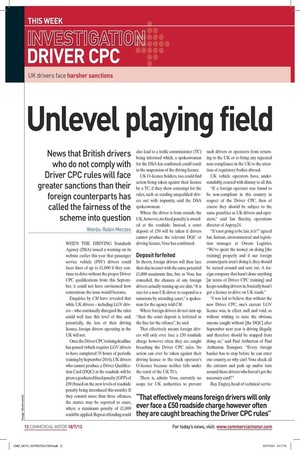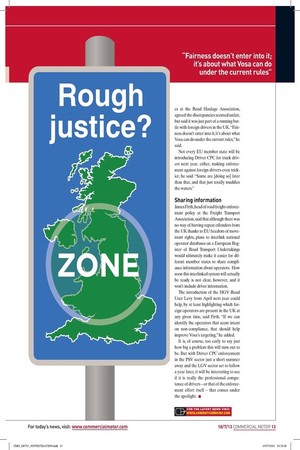Unlevel playing field News that British drivers who do not
Page 9

Page 10

If you've noticed an error in this article please click here to report it so we can fix it.
comply with Driver CPC rules will face greater sanctions than their foreign counterparts has called the fairness of the scheme into question Words: Robin Meczes WHEN THE DRIVING Standards Agency (DSA) issued a warning on its website earlier this year that passenger service vehicle (PSV) drivers could faces fines of up to £1,000 if they continue to drive without the proper Driver CPC qualifications from this September, it could not have envisioned how contentious the issue would become.
Enquiries by CM have revealed that while UK drivers — including LGV drivers — who continually disregard the rules could well face this level of fine and, potentially, the loss of their driving licence, foreign drivers operating in the UK will not.
Once the Driver CPC training deadline has passed (which requires LGV drivers to have completed 35 hours of periodic training by September 2014), UK drivers who cannot produce a Driver Qualification Card (DOC) at the roadside will be given a graduated fixed penalty (GFP) of £50 (based on the new levels of roadside penalty being introduced this month). If they commit more than three offences, the matter may be reported to court, where a maximum penalty of £1,000 could be applied. Repeat offending could also lead to a traffic commissioner (TC) being informed which, a spokeswoman for the DSA has confirmed, could result in the suspension of the driving licence.
UK 0-licence holders, too, could find action being taken against their licence by a TC, if they show contempt for the rules, such as sending unqualified drivers out with impunity, said the DSA spokeswoman.
Where the driver is from outside the UK, however, no fixed penalty is awarded at the roadside. Instead, a court deposit of £50 will be taken if drivers cannot produce the relevant DQC or driving licence, Vosa has confirmed.
Deposit forfeited In theory, foreign drivers will then face their day in court with the same potential £1,000 maximum fine, but as Vosa has conceded, the chances of any foreign drivers actually turning up are slim. "It is rare for a non-UK driver to respond to a summons by attending court," a spokesman for the agency told CM.
Where foreign drivers do not turn up, "then the court deposit is forfeited as the fine for the offence", he said.
That effectively means foreign drivers will only ever face a £50 roadside charge however often they are caught breaching the Driver CPC rules. No action can ever be taken against their driving licence or the truck operator's 0-licence because neither falls under the remit of the UK TCs.
There is, admits Vosa, currently no scope for UK authorities to prevent such drivers or operators from returning to the UK or to bring any repeated non-compliance in the UK to the attention of regulatory bodies abroad.
UK vehicle operators have, understandably, reacted with dismay to all this.
"If a foreign operator was found to be non-compliant in this country in respect of the Driver CPC, then of course they should be subject to the same penalties as UK drivers and operators," said Ian Barclay, operations director of Aspray24.
"It's not going to be fair, is it?" agreed Ian Jarman, environmental and legislation manager at Owens Logistics. "We've spent the money on doing [the training] properly and if our foreign counterparts aren't doing it, they should be turned around and sent out. A foreign company that hasn't done anything [in terms of Driver CPC training] and keeps sending drivers in, basically hasn't got a licence to drive on UK roads."
"I was led to believe that without the new Driver CPC, one's current LGV licence was, in effect, null and void, so without wishing to state the obvious, anyone caught without [the DOC] after September next year is driving illegally and therefore should be stopped from doing so," said Paul Arthurton of Paul Arthurton Transport. "Every foreign haulier has to stop before he can enter our country, so why can't Vosa check all the entrants and park up and/or turn around those drivers who haven't got the necessary card?"
Ray Engley, head of technical servic es at the Road Haulage Association, agreed the discrepancies seemed unfair, but said it was just part of a running battle with foreign drivers in the UK. "Fairness doesn't enter into it; it's about what Vosa can do under the current rules," he said.
Not every EU member state will be introducing Driver CPC for truck drivers next year, either, making enforcement against foreign drivers even trickier, he said. "Some are [doing so] later than that, and that just totally muddies the waters."
Sharing information James Firth, head of road freight enforcement policy at the Freight Transport Association, said that although there was no way of barring repeat offenders from the UK thanks to EU freedom of movement rights, plans to interlink national operator databases on a European Register of Road Transport Undertakings would ultimately make it easier for different member states to share compliance information about operators. How soon this interlinked system will actually be ready is not clear, however, and it won't include driver information.
The introduction of the HGV Road User Levy from April next year could help, by at least highlighting which foreign operators are present in the UK at any given time, said Firth. "If we can identify the operators that seem intent on non-compliance, that should help improve Vosa's targeting," he added.
It is, of course, too early to say just how big a problem this will turn out to be. But with Driver CPC enforcement in the PSV sector just a short summer away and the LGV sector set to follow a year later, it will be interesting to see if it is really the professional competence of drivers — or that of the enforcement effort itself — that comes under the spotlight. •








































